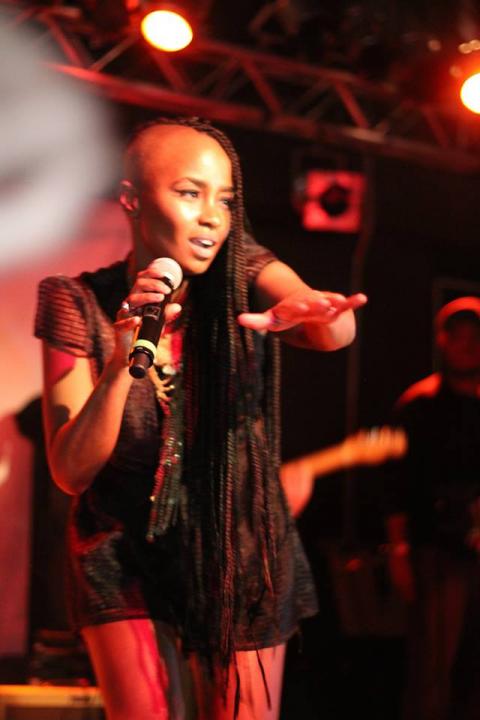Shea Rose Imparts Advice to Vocal Summit Students

Shea Rose '11
Ven Jesp
“Don’t be afraid to slow down every once in a while,” singer-songwriter, performer, and social change activist Shea Rose ’11 advised Vocal Summit Summer students during a recent clinic at the Berklee Performance Center. “There are seasons in life, and I spent a great season working really hard and grinding to get to a dream. I made it there, but I hadn’t really slowed down to realize that the person that was going for the dream had changed. Every experience I went through to get there changed me into somebody else.”
These nuggets of wisdom came from one who has already accomplished so much after graduating just a few years ago. Rose was a featured songwriter and performer on two Grammy-award winning jazz albums, the Mosaic Project and Money Jungle, both produced by Terri Lyne Carrington, Berklee percussion professor. Rose has shared the stage with Gladys Knight, Macy Gray, and Alice Smith, and is now the music curator for the RISE series at the Isabella Stewart Gardner Museum.
Upon graduating in 2011, Rose released her album Little Warrior on Facebook. “My first step was: How am I going to make money?” she said with a laugh. But to her surprise, Little Warrior became the body of music that helped to propel her into the spotlight in the Boston music community.
“As soon as I graduated, I kind of automatically went right into performing around Boston, being asked to do various interviews and magazine covers, and just a ton of stuff I didn’t expect and wasn’t prepared for,” Rose explained. “That said, not being prepared for it, I was able to ride that to a certain point and then took a break to really regroup and figure out how I was going to approach the music industry, because that’s really what I’m talking about here.”
Finding Your Voice, and Listening to It
Two years later, Rose was offered a record deal from an executive at Virgin Records. Surprisingly, she turned it down, opting to retain her artistic freedom and protect her musical integrity.
“In 2013, I had worked my butt off because I wanted a record deal. I got to that point and said, ‘No.’ It took me almost six to eight months to say no," Rose said. “I felt like my voice was getting lost right at the beginning of the negotiation process, and that was very important to me. It’s almost like you’re dating somebody and they’re like, ‘Well, I don’t want to hear any of your opinions; we’re going to just date.’”
Years later, Rose is confident that she has the tools, the knowledge, and the voice to be able to sit at that table again, due in large part to the team of people around her. She explained the importance of having two teams: one that understands the music business, and one that cares about "your health, how you’re feeling, and if you’re compromising yourself."
In response to a question regarding the social change dimension of her artistry, Rose announced the release of her newest single, a cover of Sinéad O´Connor's “Black Boys on Mopeds,” a timely release, particularly given growing concerns about racism and use of excessive force within many police departments throughout the U.S.
"[Sinéad O´Connor] wrote this song back in 1990 about a section in London where a lot of police brutality was going on," Rose explained. "They chased a young black boy on a moped, thinking he was on a stolen moped, and he drove the moped into a gas station, crashed, and died. Much of what [O' Connor] is talking about is what we are seeing in the media today."
Listen to Rose's version of "Black Boys on Mopeds" below:
Rose played “Black Boys on Mopeds" for the audience at the end of the clinic. Silence swept through the Berklee Performance Center as her beautifully haunting, moving rendition of the song took hold. As it concluded, it was clear that everyone in the auditorium had become part of a powerful experience.
When asked for her last piece of advice, Rose responded, “Slow down to hear your voice and to listen to yourself." If you do, Rose said, "I think you’ll make better decisions about yourself and any opportunities that come to you, whether it’s a contract or going on a tour or playing in a band. If you really take those moments to hear your voice, you won’t look outside for answers.”
